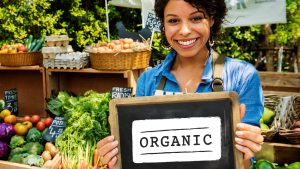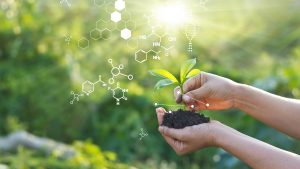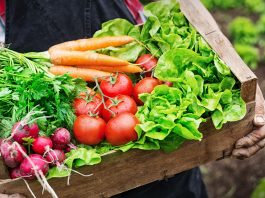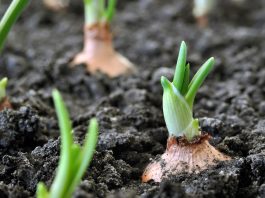COPA-COGECA’s Secretary General, Pekka Pesonen, spoke to The Innovation Platform about the future Common Agricultural Policy (CAP) and areas such as organic farming and innovations in the agriculture sector.
COPA-COGECA is the union of the two big agricultural umbrella organisations COPA and COGECA and the strongest interest group for European farmers. Founded in 1962 and headquartered in Brussels, its activity focus is on the Common Agricultural Policy (CAP) and other policy areas relevant to farmers and agri-co-operatives, such as: food safety, animal health and welfare, plant health, environment, research and innovation, and trade.
The Innovation Platform spoke with COPA-COGECA’s Secretary General, Pekka Pesonen, about areas such as organic farming, innovations both present and future (particularly with regard to those that will be necessary to achieve 2030 targets), and the future CAP.
The CAP is about our food, the environment, and the countryside. Do you feel that it is adequate in all these areas? Are there any elements that you are specifically concerned about (or, conversely, see as particularly positive)?
If you look at the three individual components, it is clear that more is needed – and yet, it is also clear that perhaps there would never be enough. It is therefore more about trade-offs. We need to see how we can develop a comprehensive policy mix in the CAP to satisfy both the objectives and the varied stakeholders and, of course, COPA-COGECA is looking into that.
At a fundamental level, the CAP needs to ensure that farmers in the EU can make an adequate income. In Europe, the agriculture sector follows a family farming model, and we need to understand how that can be made sustainable in the long term because it is practically impossible for European farming to become completely industrialised. At the same time, we cannot become completely reliant on subsidised farming either. As such, a significant challenge now is ensuring a stable income for farmers whilst also balancing societal expectations of what farms should be achieving and providing.
Indeed, a key pillar of the CAP is direct payments to farmers, designed to ensure a viable farm income. What needs to happen to guarantee that farmers receive a fair profit from their work? Has enough been done in the CAP to make sure this happens?
There is always more that can be done regarding the many objectives that we put into place – and not only those concerning farmers themselves. I believe that there should be a clearly defined plan from the EU as to what we should expect – even if that is difficult for us to swallow. Because if we were to have this, then we would all have something to stick to; we would know, for instance, what the baseline for investments would be.
And the key word here is ‘investment’; we should not substitute this for the word ‘change’ because that implies that things are going to happen without a cost, and that is absolutely not the case. We are not going to become automatically more sustainable in an ecological sense, for instance, if we just stop what we are doing. It will take ‘investment’ into things like modern farming equipment or infrastructure such as farms, barns, and greenhouses. The sector needs that investment and investment, by definition, is predictable.
How could that be achieved?
In an ideal world, this would happen at the international level, with an international set of rules being devised, at least in principle, regarding areas such as environmental and ecological sustainability. These rules, of course, would not be able to go into every detail, but they would at least provide a baseline from which to work.
One area where this is needed, and which also links directly to a quite extensive discussion that has recently been had, is climate and how agricultural efforts here can be used to secure income. However, there are still some question here about how (or if) society will accept that farmers, who are supposed to deliver foodstuffs to the market, can increasingly make a living from things like carbon credits.
This is an area that we are incredibly interested in, but we are also wary about the implications of growing biofuels. This is because we were expected to deliver the best return from the market-based approach by decoupling support in early 2000. But once the farmers did that, at least partly, because the biofuels market became available to them, we were suddenly told that this was not societally acceptable because it was seen as taking food out of the poor man’s mouth. As such, we need to be careful about how we approach such areas; even if we are able to take part in what has been termed by some as ‘societal services’ or ‘public services’ as a source of income, the fact that they don’t deliver food makes them an extremely contentious issue.
Indeed, agriculture and forestry are increasingly seen as being able to contribute to the meeting of climate and energy targets, and that, of course, is a significant element of the ‘food versus fuel’ debate. How would you like to see these facets develop, what support is needed at the policy level for that to happen, and is this an area that should be managed at Member State or even regional level?
It should be addressed at local level. The link between food production and the consumer food market really needs to be made better. Most people appear to believe that we have industrial farming in Europe, but we don’t; the size of the primary producers has been and continues to be very small; they are actually micro enterprises, most of which follow the family farming model, and while that is not set to change any time soon (and perhaps nor should it) it is nevertheless clear that productivity needs to be enhanced moving forwards.
Indeed, no sector in in economic history has survived without seeing gains in productivity, and so this is something that the European agriculture sector clearly needs to take part in. We need to explain that to society in more concrete terms. And while that does not mean that we will automatically increase output by growing in size, we should explain how we could produce more with less. It is here that areas such as organic farming have a role to play. But for the organic sector to be successful, we need to valorise organic produce, and consumers will need to pay more. Of course, with the economic downturn that is being predicted after the COVID-19 pandemic, I am not sure how realistic it is to expect that to happen.

With the cost of organic produce being perhaps one of the key barriers to a wider societal acceptance, how could that be resolved?
That is a big question for us. The organic sector has actually delivered slightly higher returns for its market share (which is around 5% on average, with land use slightly over 7%). Tripling that, which is the goal, is not something that will happen on its own; we would have to put in a lot of resources, not least to communicate the benefits of organic to wider society. We will need to place much more effort on marketing, and within the organic sector itself we will need to perform much better than we have in the past.
Communication is the key element, and there is a sense that this is something that has not yet been addressed properly by the organic community itself – despite the communications, marketing, and promotion that has indeed already taken place. The dream of tripling the organic sector’s market share in the next decade will remain just that, a dream, if we do not place substantial emphasis on promoting the produce to consumers, especially when it is they who will be expected to pay more for the goods, at least in relative terms. We also need to ensure that the technology required to achieve improved productivity gains are made available for organic farmers. And, of course, that needs to take place along the entire value chain.
Technology will have a role to play in helping European agriculture provide food for more people with potentially less resources. How would you therefore like to see research and innovation being applied in order to reverse the ongoing slowdown in productivity growth? What other drivers and policy tools could be employed through the CAP here?
Technological developments will have to be based on EU legislation, but even looking at things from the European perspective, there is a clear need to work within the international context (and not just when it comes to the organic sector). We need to apply modern technologies across the value chain.
If we look at the key driver in agriculture over the last 200 years or so when it comes to technology, this is probably improved genetic material, because this enables better varieties for crop and animal production. We have been able to produce much more than the inputs would suggest because of the better genetic materials that have been developed, as this has resulted in crops that are, in general, more resilient and which also produce a better yield. As such, I believe that biotechnology will also play a crucial role in the future of agriculture, especially in organic food.
However, there is an element of societal resistance when it comes to the application of technologies such as GM which could hinder this. Indeed, the progress that we have seen in the development of new genomics and breeding techniques has met with similar resistance, even though there have been no negative consequences from these innovations. Of course, there will always be an environmental impact, but there is such an impact from the varieties we have now, and so we actually owe it to Nature to improve our productivity because doing so we will reduce this impact. This is true for both the conventional and organic sectors.
Given the resistance to technologies such as GM, is there a danger of Europe falling behind other regions (and perhaps remaining reliant on them for food and feed) if they continue to be banned by Member States? Is it a matter of attitudes towards GM and biotechnologies simply must change, given the renewed EU focus on becoming more sustainable and self-reliant?
GM solutions exist in a variety of sectors, not only foodstuffs. Pharmaceuticals, for instance, are to a large extent based on GM technologies, and many people have no problem using them. Yet, when GM is used in foodstuffs, they are much more wary. However, in the genetic material improvement discussion we should keep GM varieties separate from those utilising other technologies because, by definition, GM involves ‘interfering’ with the internal genetic material of the plant by bringing in something from outside, whereas some of the technologies now being developed enhance the genetic material that is already there, rather than adding anything or taking anything away. This is a crucial difference when it comes to practical questions such as improving new varieties, for instance, for plant protection which could at the same time sequester carbon from the atmosphere whilst maintaining yield levels.
To take wheat as an example: we need to improve or at least maintain the root measure below the ground, and that is a difficult challenge to solve (especially with current technologies). This therefore demonstrates the need to speed up the development of new technologies in order to respond to fundamental things like climate change because the environment is going to change so rapidly that we won’t have the right toolbox to fight things like diseases if we haven’t already developed resilient crops. And we would like to do that in a way that will actually benefit the environment.
Given that need for research and development, do you feel that there is an adequate amount of funding being made available at the EU level through mechanisms such as the Horizon 2020 and Horizon Europe Framework Programmes?
We have to keep in mind that a lot of the resources for research and development come from different sources, and the money that comes from the European Union is an indication of the direction rather than being a fundamental baseline for the research agenda.
In 2018, we were very pleased to see the European Commission propose €10bn be ringfenced for the bioeconomy. But in the last Commission proposal this ringfence was removed. We are concerned about this because we certainly see the need for further research and development, and the removal of specifically allocated funds suggests that research into primary production and associated areas is no longer a priority on the EU agenda. But we believe that it is, and that it will continue to be. As such, we need to make sure that we have sufficient research funds from the European Union, but the recent proposal really wasn’t very encouraging.

With new technologies such as automation and AI becoming more widely used in the agriculture sector, how can the necessary advice and training be made available to farmers so that they are competent in areas such as precision farming?
We need to ensure that these things are available in the first place, and so first we need to consider the necessary infrastructure, which is often inadequate. For instance, during the COVID-19 pandemic we have been arranging virtual conferences for our members, but many of them, particularly if they were trying to access the event whilst on a farm, were unable to do so because of issues with connectivity and the inadequacy of rural broadband in many places. And while, of course, it could be arranged for members in such locations to connect to the event via telephone or other means, it does not solve the issue completely.
When we look at the expensive equipment that farmers would need to invest in so as to move towards precision farming, if they don’t have the basic infrastructure to support them, then they will not be able to perform as well as they should, if at all, making this impractical. This therefore means that many farmers will not make such an investment unless there are assurances in place that they will be able to make them work to their advantage.
In addition, the agriculture sector is still very much developing in this sense, and so we need to make advances in other associated areas as we move forwards, such as by ensuring proper data sharing, which is something that COPA-COGECA has been proactively pursuing in recent years along with other stakeholders. Indeed, we have published guidelines at the European level for data sharing to ensure that we have access to data and that the data generated on farms could also be shared amongst other stakeholders across the value chain, within certain rules.
Furthermore, from the EU perspective we need to have the necessary authorisations in place for things like aerial spraying, which is an example that can be used to highlight some of the wider issues with EU policy. That is, just a few years ago, there was a wide consensus in the EU that aerial spraying, which was being practised in a few Member States, should be banned as it was not accurate enough. COPA-COGECA didn’t oppose that ban because we agreed with many of the sentiments and were also aware that public perceptions of aerial spraying were quite negative.
However, that issue has since returned because in precision farming drones using artificial intelligence can be used to spray plants. However, they can actually target those individual plants that need to be treated because of pests or disease, unlike traditional aerial spraying. And yet, because of the blanket ban on aerial spraying, this is also prohibited. As such, this ban needs to be revisited and perhaps updated to take new technologies into account.
Thus, in addition to having the necessary infrastructure in place to support precision farming, we also need the right policy framework to be able to use the new technologies. And, unfortunately, we don’t yet have either.
What role will COPA-COGECA continue to play moving forwards?
We are progressive in the sense that we produce what consumers want. And that is not an easy task because, when you look at things in the EU context, what consumers actually want is often unclear. This may be because political decision making at EU level typically concentrates on various other interests and ambitions.
To again take the organic sector as an example: we are actively supporting its growth, particularly because we believe in its potential to generate better returns. And yet, it is clear that consumers are not acting in the way that the EU politicians want them to. This makes things difficult for us, especially when it is understood that the agriculture value chain must supply the markets with what they want and need. If we don’t, we will quickly go out of business.
During the COVID-19 crisis, we have seen European Commissioners say that Europe has had no issues with food security, with the only shortages being of asparagus and wine. In fact, there was an oversupply of both products, and this was made worse because of the virus. The point here is that we struggle to keep a steady supply of food stocks during a crisis such as that which we have been seeing in recent months, and that a solution to that won’t happen on its own. And, what is more, the restrictions of goods between EU Member States stands to exacerbate an already difficult situation. Brexit will, of course, also have implications here – what is going to happen between Europe and the UK once Britain leaves the EU? I believe that this will be something of a litmus test for both sides, and there is a sense that the UK will be seen as a test of how we can not only gain a more comprehensive understanding of the issues involved, but also how we can boost co-operation between partners to find solutions to market-related issues so that we can achieve the free movement of goods.
Over the last 50 years or so we have perhaps come to take things for granted and have forgotten that things don’t happen on their own; progress requires continual investment and maintenance of the single market, and it also requires streamlining border controls (if there are any in place, for instance, due to COVID-19) to ensure that we have the free movement of goods, but also labour. And this is crucial when it is understood that there are numerous sectors, not only agriculture, which depend on seasonal workers. When the borders were closed because of COVID-19, this had a significant impact on the agriculture sector, despite the fact that some people denied this – and these people need to understand that food does not simply come from a supermarket; it is the result of the efforts of thousands of people who are actively involved in the process all across the EU and, indeed, internationally. This reality needs to be hammered home as we move forwards and as we look at the Common Agriculture Policy and think about how it can be made more sustainable.
Pekka Pesonen
Secretary General
COPA-COGECA
+32 (0) 2 287 27 11
mail@copa-cogeca.eu
Tweet @COPACOGECA
https://copa-cogeca.eu
Please note, this article will also appear in the third edition of our new quarterly publication.









